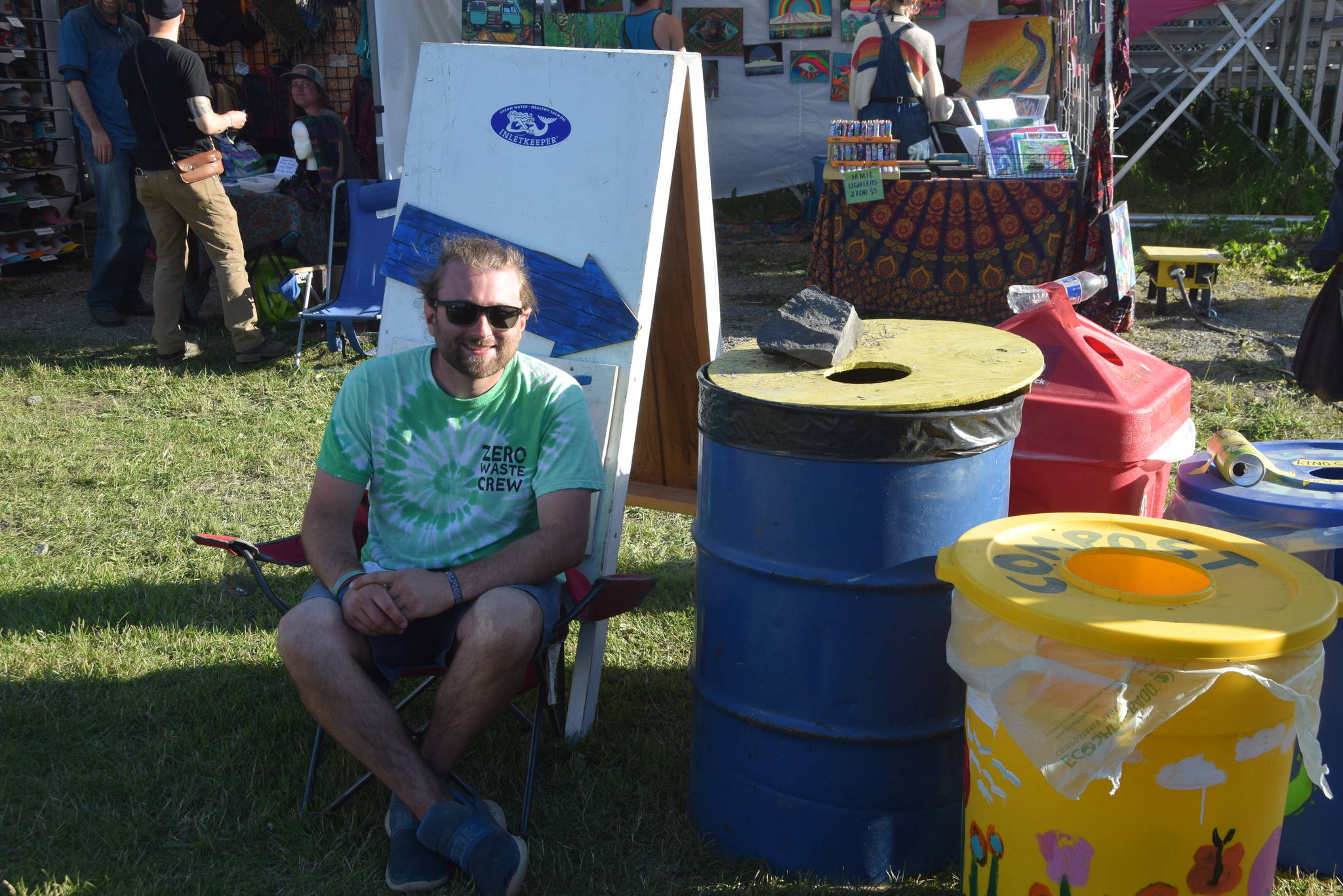Three days of fish, love and music — and three days of environmental activism. For the past three years, volunteers from Cook Inletkeeper have attempted to make the Ninilchik music festival a zero waste experience. Executive Director of Cook Inletkeeper Carly Weir said the effort has two main goals: to reduce the amount of trash produced during the festival and to educate festivalgoers about responsible waste disposal.
To reach those goals, Inletkeeper set up 11 waste stations throughout the fairgrounds, each manned by a volunteer. The stations had four disposal bins: one for plastic, one for aluminum, one for compostable materials and one for all other trash. As festival attendees went to throw away their water bottles, plates and soda cans, the volunteers manning the station would gently direct them to the appropriate bin. Meanwhile, other volunteers made the rounds emptying full bins and sorting all the trash into three large dumpsters over at the Zero Waste Depot.
Volunteer coordinator Ryan Astalos said that their strategy has been effective in the move toward zero waste because it not only gives people the opportunity to properly dispose of their trash, it is also an education opportunity for anyone unsure of which bin is appropriate for their trash. Many people expressed surprise when volunteers pointed out that their plates and silverware could be composted.
“It’s a quick interaction that still ends up being an educational experience,” Astalos said.
Weir said that in the first year of the Zero Waste Initiative, about 8% of the total waste collected was successfully composted. In the second year, that number jumped to about 20%, and this year Weir said the goal is to have 25% of the waste composted. Weir said that the volunteers learn how to improve their strategy with each year. This year some of the new strategies included adding waste disposal stations at the nearby campgrounds and distributing separate bags for trash and recycling to the campers.
In addition to educating the festivalgoers, Cook Inletkeeper has worked with the vendors at Salmonfest to ensure that most, if not all, materials given out are eco-friendly. This year is the first time that vendors were required to use compostable or recyclable materials wherever possible, so that each plate of food, each napkin and each utensil given out at Salmonfest could find its way to the compost bin rather than the trash.
“By focusing on waste on the front end with the vendors, it makes it a lot easier to walk our talk when it comes to environmental activism,” Weir said. Several of the Zero Waste volunteers reported that the compost and recycling bins were filling up much faster than the trash bins, and a large portion of the actual trash this year was tinfoil from food vendors. Weir said that there’s no effective environmental alternative to tinfoil yet, but that issue is frequently discussed during planning and brainstorming sessions.
It takes a lot of volunteers to man the waste stations for all three days, but Weir said they have had no problem finding people, and in fact had to turn some volunteers away this year. Weir said Inletkeeper has a reliable corps of volunteers, many of whom have come back year after year.
One of the volunteers, John Sanborn from Soldotna, was manning a station for the first time this year, but he’s no stranger to environmental activism. Sanborn is an intensive-needs aide at Soldotna Elementary and started the school’s recycling program a few years back.
Sanborn said that each classroom has a recycling bin now and that the program is entirely powered by the students. The kids periodically go to each classroom to pick up the bins and do a little bit of sorting before sending the materials off to be recycled, and after a certain number of pickups the students are rewarded with a pizza party.
The Inletkeeper volunteers also get a little bit of help from the local 4-H group that has kids come out Saturday, Sunday and Monday mornings to clean up the perimeter of the fairgrounds.
After the festivities are over, Weir and the other volunteers will get together to talk about what worked, what didn’t and what they can do to continue promoting ethical consumption at Salmonfest.

